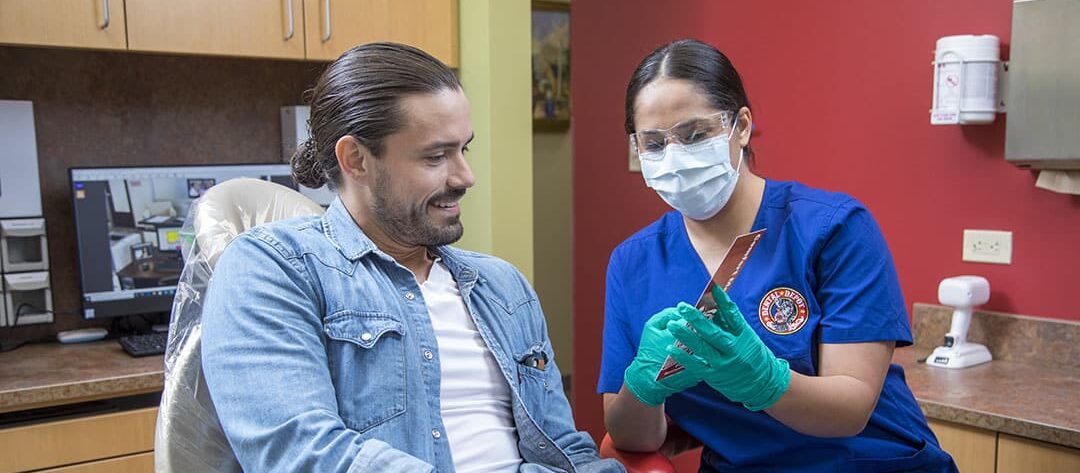
We’re our toughest critics, and we tend to be harder on ourselves than anyone else. We assume that we are the only ones experiencing something, and that everyone is thinking what we are about ourselves. Despite this flawed approach, many people apply this same thinking to their dental health.
Dental appointments are surprisingly intimate and have a significant psychological element. It’s easy to think of your smile or your mouth as a representation of you, and being embarrassed or self-conscious about it, or feeling that your dentist will judge you for it, can become an obstacle to seeking dental care. Without good dental care, your oral health declines, further embarrassing you and keeping you even farther from the dentist, creating a cycle that’s hard to break.
It’s important to remember that dentists don’t go into their profession to judge people; they go into it to help them. No matter what your oral health condition is, a good dentist will not make you feel bad about it. Instead, they’ll give you advice, recommendations, and treatment options to help make it better so you can have the best dental health possible.
Many patients are embarrassed to go to the dentist because of the condition of their teeth, including the amount of build up on the teeth and the associated odors. However, dentists and hygienists actually love when these patients come in for a professional cleaning, says Dr. Jacob Abbott of Dental Depot’s McKinney dentist office, because they can see improvement throughout the course of the treatment.
Discoloration of your teeth also doesn’t necessarily mean you’ve been doing a bad job of your oral hygiene. Drinking acidic or dark-colored beverages like coffee, wine, and tea can cause stains or discoloration in perfectly healthy teeth, as can age or even injury to the teeth. If you’re feeling self-conscious about stained or discolored teeth, ask your dentist about whitening treatments or other cosmetic procedures to help restore them.
In all actuality, restorative dental work is a good thing. When you practice good oral hygiene, you’re not trying to avoid restorations–you’re trying to avoid damage and decay. Rather than begin an annoyance, or even a sign of poor dental health, restorations like crowns, fillings, and implants are indications that you’ve taken an active approach to maintaining a healthy, functioning mouth. Without them, problems like enamel erosion, gum recession, and cavities can turn into even bigger health concerns, anything from gum disease and tooth loss to bone deterioration.
Your teeth go through a lot, and you have them for a long time–it’s natural for them to need a little help staying healthy and functioning. Millions of people have restorations, and they’re an important part of preserving your health for a lifetime.
Dental treatment is a source of apprehension for millions of people. Not only is it not something out of the ordinary for your daily routine, but you can’t see what’s happening, and it can be intimidating having someone else’s hands in your mouth. There are even terms for this fear: dental anxiety and dental phobia.
Fear or anxiety about the dentist can keep you from getting the dental care you need, but it shouldn’t–chances are, your dentist is used to helping patients experiencing this and can help you, too. Before your appointment, tell your dentist you’re feeling a little nervous, and when you arrive, don’t hesitate to discuss your concerns or ask questions. At the end of your checkup, if your dentist says you’ll need to come back in for a filling, ask what that appointment will look like. How long will it take? What will happen? What should you know for after the procedure? The more you know and the more honest you can keep your conversations with your dentist the better you’ll feel.
For many of us, our brains automatically go to the worst case scenario, including a mouthful of cavities. Teeth are incredibly strong and durable, however, and, for the most part, can withstand everything we put them through. Many patients find at a checkup that the condition of their mouths is not as bad as thought it would be.
There are occasions, however, when you may need treatment you weren’t expecting, or more of it than you thought. While it can be a little embarrassing or disappointing to hear you have a cavity or other dental condition needing treatment, there’s a silver lining to this, too, as far as your dentist is concerned: at least you’re here to get it fixed and didn’t wait for your problems to get worse.
If you feel caught off guard or surprised that you need treatment, don’t let it keep you from asking questions; some conditions develop even despite the best oral care, but the more you know about how something happened, the more you can do to try and prevent it in the future, making your mouth that much healthier.
If you are worried you’ll be judged, here are a few things to think about before you jump to conclusions:
Your dentist has seen it all. Your dentist sees dozens, if not hundreds, of patients, and they’ve seen all kinds of patients over the course of their career. There is a good chance that whatever you’re embarrassed about they’ve not only seen before but will not be surprised by.
Your dentist is examining your mouth, not you. Your dentist’s job is to preserve the health of your mouth. That’s it. Dental care is pretty analytical. During your exam, the dentist is looking at things like the density of the bone, the strength of the enamel, and the condition of the oral tissues; they aren’t making any judgements on you or your lifestyle. Their recommendations for treatment will be based solely on what’s best for your mouth to help make sure it stays healthy for a lifetime.
Your dentist is there to help. Your dentist’s primary goal is to help you achieve your best oral health, not to make you feel bad. If you do feel as if your dentist is judging you, it may be time to find another provider. Your dentist should be straightforward with you, but deliver recommendations and findings with compassion and tact. Much like physicians, different dentists will have different methods and different bedside manners, so if your current dentist doesn’t make you feel comfortable and at ease, it’s okay to try another one.
”It’s a wonderful thing when a patient decides to put their health first and work toward a healthier mouth,” according to Dr. Abbott. No matter what the patient’s oral health looks like, “there’s no judgment, because we’re just as excited as you are–if not more so–to get healthy and stay healthy.”
At Dental Depot of DFW, we believe everyone deserves quality dental care delivered with respect and compassion. We work hard to make our comprehensive dental services affordable and convenient, with multiple payment options, flexible scheduling, and Saturday appointments at all of our DFW metro locations. At Dental Depot, you’ll never have to worry about being judged for your dental health. Our staff of professionals is here to help, no matter what condition your oral health is, and we’ll never turn away a patient because of inability to pay. Schedule an appointment today and find out how we can help you find your way to better oral health.
Dr. Jacob Abbott is a graduate of BYU-Idaho and Texas A&M College of Dentistry. Dr. Abbott, a native of Flower Mound, is excited to be involved as a general dentist in his local community.
During his undergraduate education, Dr. Abbott had the opportunity to serve a volunteer humanitarian mission in the wonderful country of Thailand from ’07-’09. Even though he is a little rusty, he can speak, read, and write in Thai and of course enjoys Thai food as long as it’s not too spicy (but don’t ask him to cook it).
